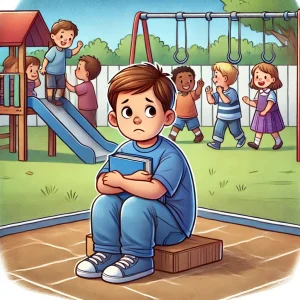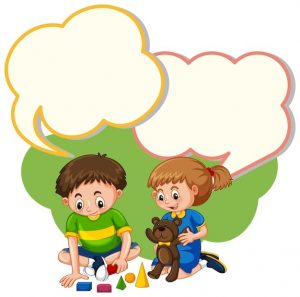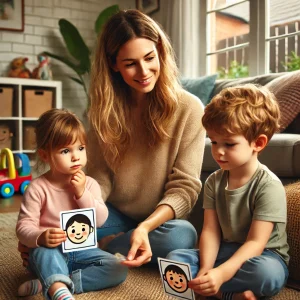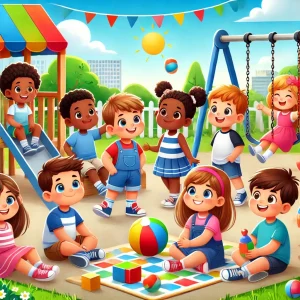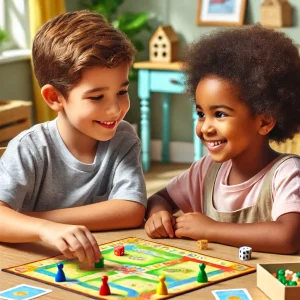8 Everyday Situations Social Stories Can Help Your kids
Last Updated: January 9, 2025
Social stories are concise, structured narratives designed to teach children how to navigate everyday social situations effectively. These stories, often illustrated and written from a child’s perspective, explain social norms and expectations, helping children understand and manage social interactions. By breaking down complex social cues into manageable parts, social stories equip children with the confidence to engage with peers and adults more successfully, making them an invaluable tool for parents and educators seeking to enhance a child’s social skills and reduce anxiety in unfamiliar situations.
Struggling to explain daily routines to your child? Download these Social Stories tailored for kids Autism and make communication easier!
Download NowEveryday Situations Where Social Stories Can Be Effective
Social stories for kids serve as practical guides for children, helping them navigate a variety of daily activities. Here’s how these stories can be effectively used in different everyday situations:
- Morning Routines – Starting the Day Right
- Social stories simplify morning activities like brushing teeth and getting dressed.
- They help children understand the sequence of morning tasks, making routines more engaging.
- School Time – Navigating the Classroom Environment
- These stories prepare children for classroom interactions and following instructions.
- They simulate classroom scenarios, helping children understand how to participate and behave.
- Making Friends – Learning Social Skills
- Social stories demonstrate how to share, initiate play, and interact with peers.
- They teach crucial steps in making and maintaining friendships through understandable scenarios.
- Visiting the Doctor or Dentist – Reducing Anxiety
- Stories can outline what to expect during medical visits, reducing children’s anxiety.
- They help familiarize children with medical environments and procedures.
- Mealtime Behavior – Encouraging Proper Etiquette
- Social stories can explain mealtime etiquette like using utensils and chewing with a closed mouth.
- They promote polite behavior at the table, making mealtime more pleasant.
- Playing at the Park – Sharing and Taking Turns
- Stories used at the park teach children about sharing and turn-taking with play equipment.
- They ensure children know how to interact harmoniously during playtime.
- Bedtime Routines – Ensuring a Smooth Transition to Bed
- Bedtime social stories can help establish a calming routine, aiding children in winding down.
- They make bedtime a predictable and relaxing end to the day.
- Handling Emotions – Teaching Emotional Regulation
- These stories illustrate appropriate ways to express and manage emotions like anger or excitement.
- They provide strategies for coping with emotional challenges, enhancing emotional intelligence.
Common Topics Covered by Social Stories
| Topic | Examples of Scenarios |
|---|---|
| Morning Routines | Waking up, brushing teeth, getting dressed, packing a school bag. |
| School Time | Sitting in class, raising a hand to speak, following teacher’s instructions. |
| Playing with Friends | Sharing toys, taking turns, asking to join a game. |
| Mealtime Etiquette | Using utensils, chewing with mouth closed, asking politely for food. |
| Visiting the Doctor or Dentist | Waiting in the lobby, sitting calmly, understanding what the doctor will do. |
| Bedtime Routines | Brushing teeth, putting on pajamas, reading a book, turning off lights. |
| Handling Emotions | Managing anger, understanding disappointment, expressing joy or excitement. |
| Public Behavior | Staying close to parents, waiting in line, using an indoor voice. |
Conclusion
Social stories can transform daily challenges into fun, manageable lessons for kids. These simple, engaging stories teach essential social skills, helping children navigate their world with confidence. From making friends to managing bedtime, social stories prepare kids for everyday interactions. At Wellness Hub, we provide a variety of resources to support your child’s journey. Explore our site today and see how social stories can make a positive difference in your child’s life. Let’s help our children thrive in social settings with every story we share!
Frequently Asked Questions:
1. What are social stories for kids?
Social stories are customized, short narratives created to show children how to handle specific situations appropriately by outlining social cues, expected behaviors, and the perspectives of others. They are used to teach social norms, routines, and basic interactions in an engaging way that children can easily understand.
2. How do social stories help children?
These stories act as practical guides for children, illustrating step-by-step actions and explaining the reasoning behind them. This helps children learn not only what to do but why certain responses are necessary, improving their social understanding and reducing anxiety about unknown situations.
3. Can social stories improve my child’s behavior?
Yes, many parents and educators report improvements in behavior and understanding after using social stories. These stories help children anticipate what will happen in different scenarios, leading to fewer behavioral issues and increased confidence in managing new experiences.
4. When should I start using social stories with my child?
You can start using social stories as soon as your child begins interacting with others or needs to learn new routines, typically around the age of three or when they enter preschool. They are a great tool for preemptively managing transitions and new social settings.
5. Are social stories effective for children with autism?
Social stories are particularly effective for children with autism because they directly address the challenges these children might face with social cues and norms. They provide a clear, concise framework that can help reduce stress and improve understanding in social interactions.
6. What topics should social stories cover for my child?
Social stories can cover a wide range of topics relevant to your child’s daily life and learning. Common topics include school routines, visiting the doctor, playing with friends, dealing with emotions, and learning new skills like tying shoes or using polite words.
7. How often should I use social stories?
Regular use of social stories can help reinforce the behaviors and skills they teach. For ongoing issues or new challenges, daily reading may be beneficial. For general maintenance of social skills, a few times a week might suffice.
8. Can I create my own social stories?
Absolutely! Creating your own social stories allows you to tailor the content specifically to your child’s needs and the specific situations they face. This personalization can make the stories more relatable and effective. Simple templates and guides online can help you get started.
9. Where can I find resources for social stories?
You can find a variety of social story resources on our website, Wellness Hub. We offer ready-made stories and templates that you can customize. Libraries, educational websites, and special education professionals are also good sources for finding or creating social stories.
10. How long should a social story be for effective learning?
Keep social stories short and focused—typically a few sentences to a small paragraph per topic. The key is to maintain the child’s attention and convey the message clearly without overwhelming them. Each story should be concise enough to read in one sitting but detailed enough to provide a complete understanding of the situation.
About the Author:
Shravanaveena Gajula
M.Sc ., Speech and Language Pathology (5+ years of experience)
Shravanaveena Gajula is a dedicated Audiologist and Speech-Language Pathologist with a BASLP and an M.Sc in Speech and Language Pathology. With experience spanning multiple settings, including Wellness Hub and Ashray Akruti, Veena specializes in a wide range of disorders from developmental issues in children to speech and language assessments in adults. Her expertise includes parent counseling, managing speech sound and fluency disorders, and creating individualized therapy programs. Veena is also PROMPT certified and an author of several insightful blogs on speech and language pathology, aiming to educate and assist caregivers in supporting their loved ones.
Book your Free Consultation Today
Parent/Caregiver Info:
Client’s Details:
* Error Message
